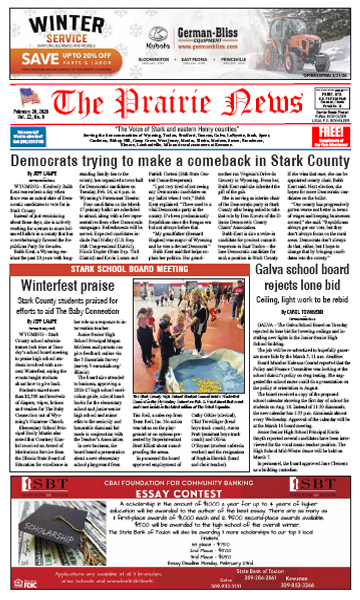School board makes its case
By NICK VLAHOS
For The Weekly Post
PRINCEVILLE – The Princeville School District wants more of a say in how the village handles tax-increment financing. The school district also appears to want more of that property-tax revenue, too.
School Superintendent Tony Shinall and two district board members stated their case during a Village Board TIF Committee meeting Aug. 19. They suggested a TIF-induced limit on the school’s share of property-tax increases in most of the village impacts operations adversely.
“We feel like there’s a lack of collaboration and urgency,” said School Board member Erin Murphy. “That’s why we’re here, to get that communication and collaboration started. We’re not opposing development. We’re just advocating a little more balance.”
Committee members and Village President Jeff Troutman appeared open to school-district overtures. But during the committee meeting and the subsequent full village board meeting, some officials disputed school-district claims.
“I’m more than willing to sit with you guys and work something out that’s doable for everybody,” Troutman told Shinall, Murphy and School Board President Amy Davis.
“Hopefully, we can come to an agreement and get something done. We’re not trying to be bad neighbors, that’s for sure.”
In TIF districts, property taxes that are to go to various bodies are frozen. Subsequent tax increases are diverted into a fund used for infrastructure improvements. Almost all of Princeville is in one of four TIF districts.
“When it comes to school districts in our county, that is super unique,” Shinall said. “Just the percentage of the village that’s in a TIF.”
TIF-related restrictions can lead to the school district needing to raise its tax rates, according to Davis and Murphy. The school district includes Edelstein, Laura and Monica, as well as adjacent rural areas. Neither Davis nor Murphy reside in Princeville.
“What happens here affects me,” Davis said. “I may not know exactly what goes on here in the village. All I see is my taxes being raised.”
Murphy suggested it’s unrealistic for the school district to survive on tax revenue from the oldest Princeville TIF district, which dates to 1993, given inflation. She said the school district has missed out on $5 million in overall tax money since then.
But Troutman said property values in the 1993 TIF district were reset to levels current when it was renewed after its initial 23-year term. Murphy asked the board for metrics and more accountability regarding TIF money, but Trustee Spencer Wilson said that’s available on village and state websites.
“Every time there’s some sort of program approval, it’s all in black and white there,” Wilson said during the regular board meeting. “They were trying to say there is a lack of collaboration and urgency and program tracking. I respectfully disagree. I found years of it. I found it in two hours.”
The school-district contingent did not attend the regular meeting. The village has been negotiating with the school and other area taxing bodies regarding increasing their share of TIF money. Troutman indicated a meeting this winter with school officials would be optimal.
Following the meetings, Troutman said the village is seeking a new code-enforcement officer. The previous one, Dan Sullivan, resigned effective Aug 2. Troutman and trustees are to handle code-enforcement issues for now. Sullivan did not indicate a reason, according to the village president.
Earlier this year, the board voted to change the position from a 12-month term to an April-through-October one, with an officer available as needed in the other months. Troutman cited a dearth of code violations during winter.
During the regular meeting, trustees approved $2,500 TIF Residential Rehabilitation Program reimbursements for a new garage roof at 235 N. Walnut Ave. and for house paint at 103 N. Cottage Grove Ave.
Following closed session, the board voted to settle an issue regarding a delayed response to an Illinois Freedom of Information Act request from the Peoria Standard, a public-data-focused news service.
The village did not receive the publication’s emailed FOIA request, which apparently was sent in January, according to Troutman. Usually, public bodies have five business days to respond. Attorneys advised the village to pay the filing costs – probably a couple of hundred dollars, Troutman said.







